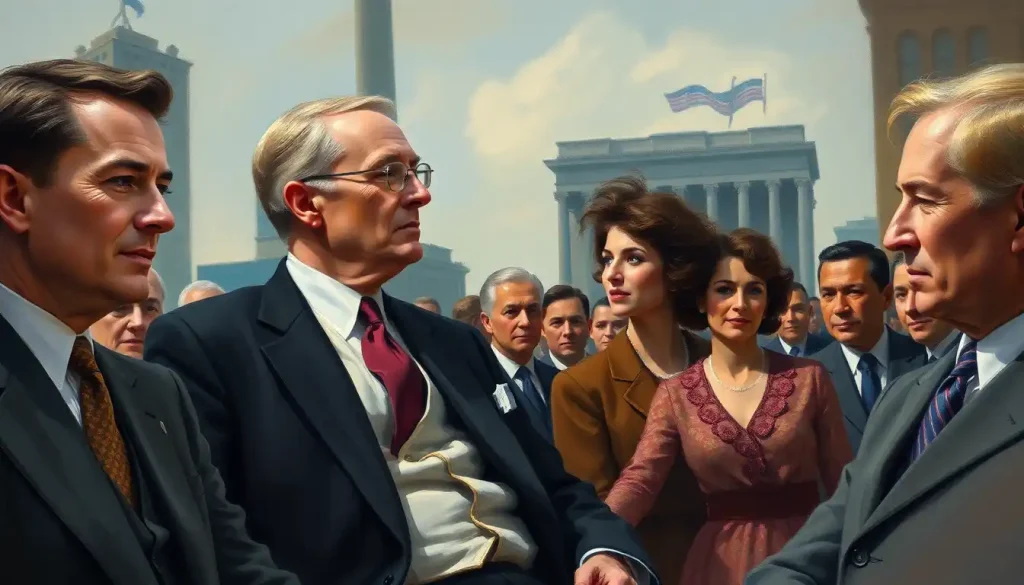Money’s relentless pursuit of more money has shaped the American story since its earliest days, setting up an epic clash between those who accumulate vast private fortunes and those who champion the common good. This enduring struggle, often referred to as “Wealth Against Commonwealth,” has been a defining feature of the nation’s economic and political landscape for generations.
The phrase “Wealth Against Commonwealth” originates from Henry Demarest Lloyd’s groundbreaking book of the same name, published in 1894. Lloyd’s work exposed the ruthless practices of Standard Oil and other monopolies, shedding light on the growing tension between private wealth accumulation and public welfare. While over a century has passed since Lloyd’s scathing critique, the issues he raised remain strikingly relevant in our modern era.
At its core, the concept of “Wealth Against Commonwealth” encapsulates the ongoing conflict between the interests of powerful corporations and the well-being of society as a whole. It’s a battle that has raged since the nation’s founding, with each side vying for supremacy in shaping America’s economic future.
The Rise of Corporate Power in America
The Industrial Revolution marked a turning point in American history, ushering in an era of unprecedented economic growth and technological innovation. However, it also paved the way for the emergence of powerful monopolies and corporate behemoths that would come to dominate entire industries.
As factories sprouted across the landscape and railroads crisscrossed the continent, a select group of industrialists amassed enormous fortunes. Names like Rockefeller, Carnegie, and Morgan became synonymous with wealth and power. These “robber barons,” as they were often called, built vast business empires that controlled key sectors of the economy.
The oil industry, under the iron grip of John D. Rockefeller’s Standard Oil, exemplified this trend. Through aggressive tactics and strategic acquisitions, Standard Oil grew to control over 90% of oil production and refining in the United States. Similarly, Andrew Carnegie’s steel empire and J.P. Morgan’s financial conglomerate exerted outsized influence over their respective industries.
This corporate consolidation had far-reaching effects on both the economic and political landscapes. As companies grew larger and more powerful, they gained increasing sway over government policies and regulations. The line between business and politics blurred, with corporate interests often taking precedence over the needs of ordinary citizens.
Public Interest vs. Corporate Interests: A Delicate Balance
To understand the full scope of this conflict, we must first grasp the concept of “commonwealth.” In its broadest sense, commonwealth refers to the general welfare or common good of a community or nation. It encompasses shared resources, public institutions, and the collective well-being of all citizens.
The importance of commonwealth cannot be overstated. It forms the foundation of a stable, prosperous society where all members have the opportunity to thrive. However, the pursuit of private wealth often comes into direct conflict with the preservation and promotion of the commonwealth.
Corporate practices that prioritize profit over public welfare abound throughout history and continue to this day. Examples include environmental degradation, worker exploitation, and the manipulation of markets to stifle competition. These actions may boost short-term profits but often come at a significant cost to society at large.
The government plays a crucial role in balancing private and public interests. Ideally, it should act as a referee, ensuring fair competition while protecting the rights and well-being of citizens. However, the reality is often more complex, with corporate influence sometimes skewing policies in favor of private interests.
Wealth privilege further complicates this dynamic, often tipping the scales in favor of those who already possess significant financial resources. This creates a self-perpetuating cycle where wealth begets more wealth, often at the expense of broader societal progress.
Case Studies: Historical Examples of ‘Wealth Against Commonwealth’
To truly appreciate the impact of the “Wealth Against Commonwealth” struggle, we need only look at some of the most egregious examples throughout American history.
Standard Oil, as mentioned earlier, stands out as a prime example of corporate power run amok. Under Rockefeller’s leadership, the company engaged in predatory pricing, industrial espionage, and bribery to crush competitors and maintain its monopoly. While this strategy led to increased efficiency and lower oil prices for consumers, it also concentrated immense power in the hands of a single corporation.
The railroad industry provides another compelling case study. As the nation’s primary mode of long-distance transportation in the late 19th century, railroads wielded enormous influence over the economy. Companies like the Pennsylvania Railroad and the New York Central Railroad engaged in rate discrimination, favoring large shippers over small farmers and businesses. This practice led to widespread discontent and eventually spurred government intervention.
In more recent times, we’ve seen similar patterns emerge in the tech and pharmaceutical industries. Tech giants like Google, Facebook, and Amazon have come under scrutiny for their market dominance and data collection practices. Meanwhile, pharmaceutical companies have faced criticism for exorbitant drug pricing and patent manipulation tactics that prioritize profits over public health.
These examples illustrate how unchecked corporate power can lead to practices that benefit a select few at the expense of the many. They underscore the ongoing relevance of Lloyd’s “Wealth Against Commonwealth” concept in our modern era.
The Progressive Era and Anti-Trust Legislation: A Turning Point
The excesses of the Gilded Age eventually sparked a backlash in the form of the Progressive Era. This period, roughly spanning from the 1890s to the 1920s, saw a wave of reforms aimed at curbing corporate power and promoting social welfare.
Key legislative actions during this time included the Sherman Antitrust Act of 1890, the Clayton Antitrust Act of 1914, and the creation of regulatory bodies like the Federal Trade Commission. These measures sought to break up monopolies, promote fair competition, and protect consumers from corporate abuses.
The impact of these anti-trust laws on corporate power was significant. Standard Oil, for instance, was broken up into 34 separate companies in 1911, marking a major victory for the progressive movement. Similar actions were taken against other monopolies, helping to restore a degree of balance to the economic landscape.
However, the success of progressive reforms was not absolute. While they did manage to curb some of the most egregious corporate abuses, they did not fundamentally alter the structure of American capitalism. Corporations adapted to the new regulatory environment, finding new ways to consolidate power and influence policy.
Contemporary Relevance of ‘Wealth Against Commonwealth’
Fast forward to the present day, and we find that the struggle between wealth and commonwealth continues unabated. In fact, some argue that the concentration of wealth and power has reached levels not seen since the Gilded Age.
Wealth inequality has become a defining issue of our time. According to recent studies, the top 1% of Americans now hold more wealth than the entire middle class combined. This concentration of wealth has far-reaching implications for social mobility, political influence, and overall societal well-being.
Corporate influence on politics and policy-making remains a contentious issue. The landmark Citizens United decision, which allowed for unlimited corporate spending on political campaigns, has further blurred the line between corporate and public interests. This has led to concerns about the outsized influence of wealthy individuals and corporations on the democratic process.
Regulating multinational corporations presents new challenges in our globalized economy. Companies can now easily shift operations and profits across borders, making it difficult for any single nation to effectively regulate their activities. This has led to calls for international cooperation to address issues like tax avoidance and labor exploitation.
Understanding the key differences between being wealthy and being rich is crucial in this context. True wealth often translates into lasting influence and power, while merely being rich may not confer the same level of societal impact.
The Ongoing Struggle: Reflections and Future Outlook
As we reflect on the ongoing struggle between wealth and commonwealth, it’s clear that this is not a battle with a definitive end. Rather, it’s a continuous process of negotiation and adjustment between private interests and the public good.
The importance of civic engagement and informed citizenship cannot be overstated in this context. An engaged populace, aware of its rights and responsibilities, serves as a crucial check on both corporate and government power. Initiatives like the Share Our Wealth program, while controversial, highlight the ongoing debate about economic equality and the distribution of resources in society.
Looking to the future, the challenge lies in finding new ways to balance corporate power and public interest in an increasingly complex global economy. This may involve rethinking our approach to corporate regulation, reimagining the role of government in the economy, and fostering a new ethic of corporate responsibility.
Understanding the principles and applications of common wealth law could provide valuable insights into how we might structure a more equitable economic system. Similarly, exploring the concept of constitution wealth could offer new perspectives on safeguarding financial freedom while promoting the common good.
As we navigate these challenges, it’s worth remembering that the American economic story is not just an empire of wealth, but also a testament to the enduring power of democratic ideals and collective action. The ongoing tension between private wealth and public welfare has been a driving force for progress, spurring innovations in law, policy, and social organization.
In conclusion, the concept of “Wealth Against Commonwealth” remains as relevant today as it was when Henry Demarest Lloyd first coined the phrase. It serves as a powerful lens through which we can examine the complex interplay between corporate power, government regulation, and public welfare. As we move forward, the challenge lies in harnessing the dynamism of capitalism while ensuring that its benefits are more equitably distributed across society.
Understanding wealth’s role in modern politics is crucial for anyone seeking to navigate this complex landscape. By staying informed and engaged, we can all play a part in shaping a future where wealth and commonwealth are not locked in perpetual conflict, but work in harmony to create a more prosperous and equitable society for all.
References:
1. Lloyd, H. D. (1894). Wealth against commonwealth. New York: Harper & Brothers.
2. Piketty, T. (2014). Capital in the Twenty-First Century. Harvard University Press.
3. Zingales, L. (2017). Towards a Political Theory of the Firm. Journal of Economic Perspectives, 31(3), 113-130.
4. Reich, R. B. (2015). Saving Capitalism: For the Many, Not the Few. Knopf.
5. Wu, T. (2018). The Curse of Bigness: Antitrust in the New Gilded Age. Columbia Global Reports.
6. Stiglitz, J. E. (2012). The Price of Inequality: How Today’s Divided Society Endangers Our Future. W. W. Norton & Company.
7. Teachout, Z. (2014). Corruption in America: From Benjamin Franklin’s Snuff Box to Citizens United. Harvard University Press.
8. Sitaraman, G. (2017). The Crisis of the Middle-Class Constitution: Why Economic Inequality Threatens Our Republic. Knopf.
9. Hacker, J. S., & Pierson, P. (2010). Winner-Take-All Politics: How Washington Made the Rich Richer–and Turned Its Back on the Middle Class. Simon & Schuster.
10. Lessig, L. (2011). Republic, Lost: How Money Corrupts Congress–and a Plan to Stop It. Twelve.












Would you like to add any comments? (optional)